The Philadelphia Flyers and Sean Couturier have gone hand in hand for over a decade now. His impact on the team has been invaluable from the moment he first suited up for the Flyers. With him still going strong, how has his career played out?
Couturier’s Early Years
After being selected with the eighth-overall pick in the 2011 NHL Draft thanks to the Columbus Blue Jackets desperately vying for the services of Jeff Carter, Couturier quickly became a staple in the Flyers’ lineup. Playing 77 games as a teenager is pretty rare, but that’s exactly what Couturier did.
General manager (GM) Paul Holmgren’s youth movement that season was in full swing, and the 19-year-old was a big part of it. Granted, he was playing fourth-line minutes, but he was a reason for the team’s 47-26-9 record that season.
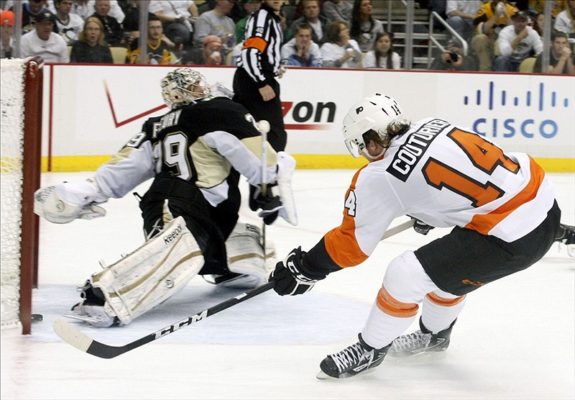
Couturier was consistently playing with forwards Zac Rinaldo and Maxime Talbot on his line, so the opportunity for offensive creation was slim. Nonetheless, he registered 11 goals and 13 assists at even strength, which is pretty impressive given his situation. His potential offensively was pretty clear with his actual on-ice play in consideration, but he never really got a chance to show that on the fourth line.
The NHL’s best goal scorers typically have a high total in goals above expected, and Couturier was fourth on the team in the regular season in that regard. His defensive abilities were elite for his young age as well, with his line being the lowest in terms of expected goals against per 60 minutes among combinations that played 100 or more minutes together during the season. His underlying analytics were solid for his age.
In the 2011-12 postseason, Couturier really started to become known after his Game 2 effort against the Pittsburgh Penguins, where he notched a hat trick in the Flyers’ 8-5 victory. The Flyers eventually lost to the New Jersey Devils in the second round, but the youngster’s line ranked second on the team in terms of expected goals for. His offensive abilities were beginning to show.
By the time the shortened 2012-13 season came around, Couturier had high expectations for his future. His base numbers would suggest he wasn’t great offensively, and that’s not entirely wrong. His goals above expected went from second-best on the team to the second-worst behind only Danny Briere, who was bought out after that season.
Related: Putting Sean Couturier’s Offense Into Context
Couturier didn’t have one line that he stuck with the entire season, but essentially all of them were the best on the team in terms of expected goals against. He was a difference-maker, but he just needed to click offensively. In a solidified bottom-six role, he was never really going to get that chance. He was still an important contributor to the team, but he was not yet the well-rounded player that he became later in his career.
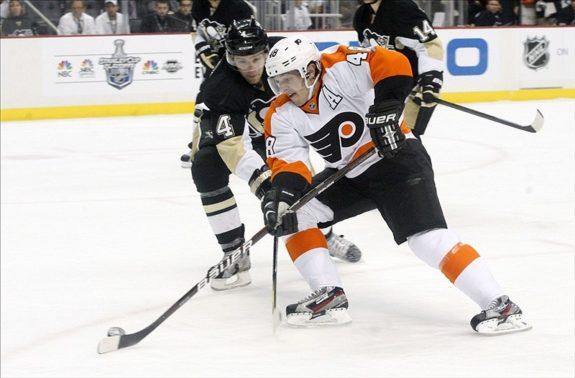
By the 2013-14 NHL season, Couturier was starting to blossom into a better offensive player. His lines were obtaining a large chunk of expected goals when he was playing with great linemates such as Claude Giroux or Wayne Simmonds, but the same could not be said for when he was playing with a past-his-prime Vinny Lecavalier or Steve Downie, which was unfortunately pretty frequent.
Couturier was still just 21 years of age, but by this point, he had been with the Flyers for nearly 97 percent of all of their games from the 2011-12 season up until 2013-14. With 31 even strength points on the season and another terrific defensive campaign, he finished ninth in Selke Trophy voting that season. He ranked third-worst on the team in goals above expected, but he was still getting better offensively in terms of total output.
Even in the 2014-15 season, Couturier still wasn’t getting ice time with elite linemates. He played almost 400 minutes with R.J. Umberger that season, who had arguably the worst campaign of his entire career. Even though he was still playing in the bottom-six more often than not, his goals above expected ranked fourth among forwards, so his shot was something that was improved. After four seasons in the league, he hadn’t gotten a consistent chance to play with the big guns.
In the 2015-16 season, things finally started to change for Couturier. He did regress back to being one of the worst players on the team in terms of goals above expected, but he was finally able to snag a second-line role with the team, primarily with Simmonds and Matt Read. Among lines that played 100 or more minutes together, this was the second-best on the Flyers in terms of expected goals for and against. The 23-year-old center finished eighth in Selke Trophy voting this season, and it would be the fourth time in his career that he would finish with votes for the award. Clearly, he was one of the most valuable members of the team.
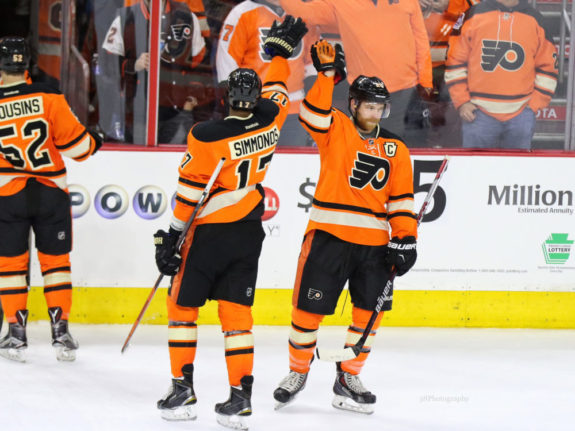
Couturier’s 2016-17 season was the last of his developing years. He hadn’t grown increasingly more important to the Flyers, but was simply getting a better chance to do so than in prior seasons. In his sixth season in the NHL, he finished seventh in both goals and assists per 60 minutes, which was beginning to put him among the premier forwards on the team. His most frequent line had one of the worst expected goals against per 60 minutes on the team, but his other lines did exceptionally well. It was a good season for him overall, and his offense was starting to improve. He might not have known it at the time, but he was on the verge of a true breakout the very next season.
Couturier’s Prime
Couturier’s 2017-18 season was nothing short of spectacular. This was his first real taste of first-line action and being paired with Giroux, it was arguably the best season that either of the two have ever had.

Coming off of a 58-point campaign in 2016-17 after hip surgery that offseason, Giroux instantly became one of the best offensive producers in the entire NHL with 102 points. It has been argued that he should have won the Hart Trophy as the most valuable player to his team in the league, but that season doesn’t happen without the help of Couturier.
Couturier led the team by eight in terms of expected goals, with 34.3, but Giroux had a monster shooting season where he registered over 12 goals above expected. Nevertheless, the 25-year-old had become not just a good offensive player, but an elite one. He was one of the best shooters on the team in spite of what his minus-3.3 goals above expected might suggest.
When Couturier was playing with Giroux and Travis Konecny that season, which was for almost 500 minutes, their expected goals for per 60 minutes sat at 2.98, while their expected goals against was just 2.14. When Voracek was playing with him and the 102-point scorer, which was for nearly 400 minutes, they had an expected goals for per 60 minutes of 3.08 and an expected goals against per 60 minutes of just 2.24.
If there was any year where Couturier deserved to win the Selke Trophy, it was probably this one. He settled for second place to Anze Kopitar, so even he can’t be too mad about that.
In the playoffs, playing Games 5 and 6 on a torn MCL, Couturier was arguably at his peak. In his series against the Penguins, he scored five goals and nine points in just five games, and had a total of 2.7 goals above expected. He was a completely different animal, but his efforts were still not enough, as Philadelphia fell in six games.
After a masterful 2017-18 campaign, a near-point-per-game pace started to become the norm for Couturier. In his 2018-19 season, he posted 76 points in just 80 games, continuing his two-way dominance. He went on to have his best goals above expected season to date, with a plus-5.5 rating on the season. He and his linemates weren’t as fantastic as they were the year before in terms of their ability to prevent goals from being scored, and perhaps that contributed to a disappointing 37-37-8 season.
With a coaching change to Alain Vigneault for the 2019-20 season, the Flyers were an elite team for one of the very few times in Couturier’s career. As such, he had an excellent defensive season, and even enjoyed solid offensive output.
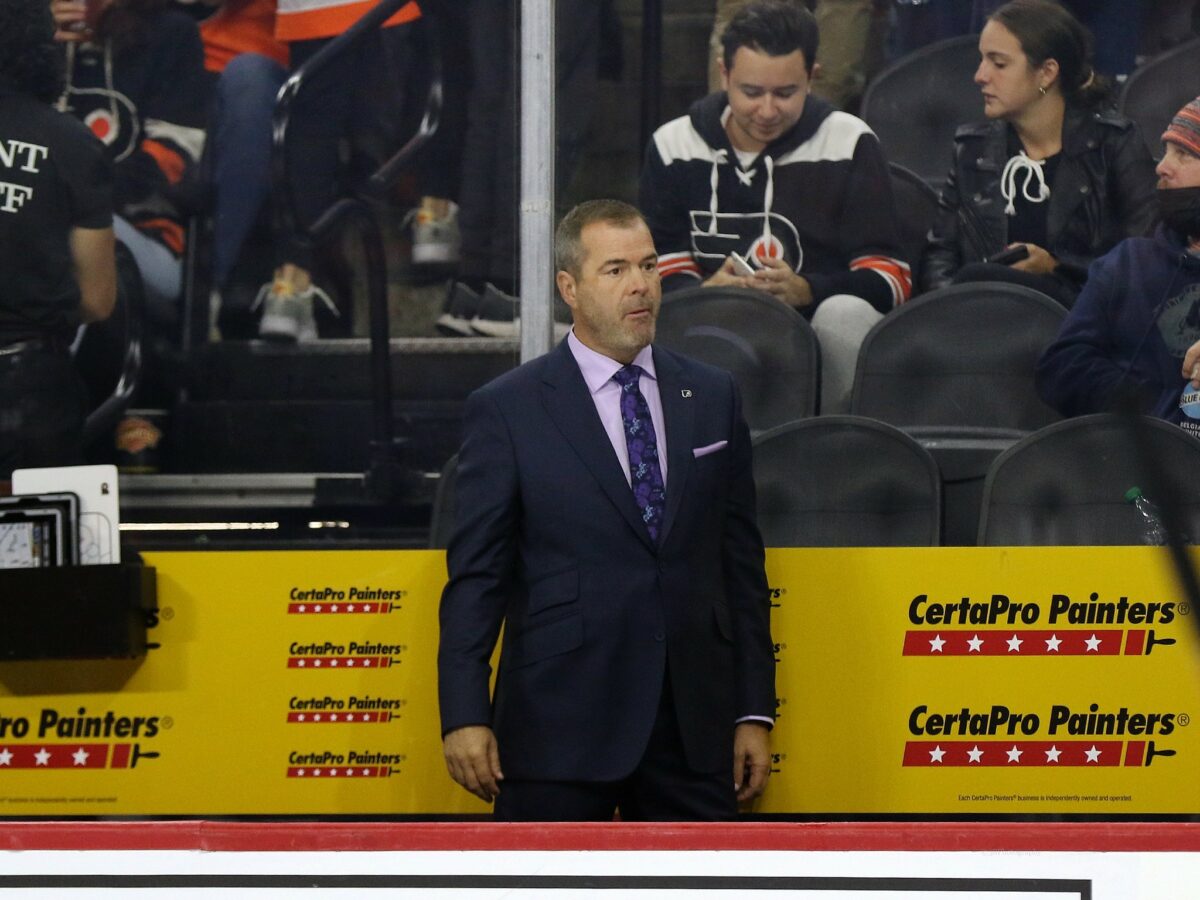
Couturier’s lines during the year were all terrific defensively. As a result, he and the Flyers had a 41-21-7 record in the shortened season. They would go on to lose in a seven-game series to the New York Islanders in the playoffs, but the 27-year-old was finally able to capture the Selke Trophy after nine years of chasing it. Overall, it was an immensely successful season for him.
Things didn’t change for Couturier in his 2020-21 season. His 41 points in 45 games was the best point-per-game pace on the team. This was the first time he had ever led the team in point efficiency in his career, so it was an important development in his offensive game. For his efforts, he earned an eight-year contract worth $62 million in total value that offseason. He earned every penny, especially since he had been playing on a contract with a cap hit of just $4.33 million.
Modern Couturier
After his 2020-21 season, things began to spiral for Couturier due to injuries. In 2021-22, he was only able to play in 29 games for Philadelphia. His 17 points were low for his standards, but the Flyers sorely missed him that season, finishing with the fourth-worst record in the entire NHL.
Couturier didn’t play a single game in 2022-23, which was a gut punch for the Flyers. From day one, their season was essentially over. They did a good job to finish with a semi-respectable 31-38-13 record, but his impact was being put on full display. In his absence from most of the 2021-22 season through 2022-23, the club had a 44-72-19 record. Over an 82-game season, that would have registered them just 65 points.
Finally returning for the Flyers’ 2023-24 season, nobody really knew what to expect out of Couturier. Being a shell of himself and slow to start off would seem probable, especially considering he entered the season as a 30-year-old not having played in a regular season game since Dec. 18, 2021. However, he instantly became a key contributor, scoring four points in his first five games, and having a plus-4 rating on the season. Right away, he was one of the Flyers’ best players.
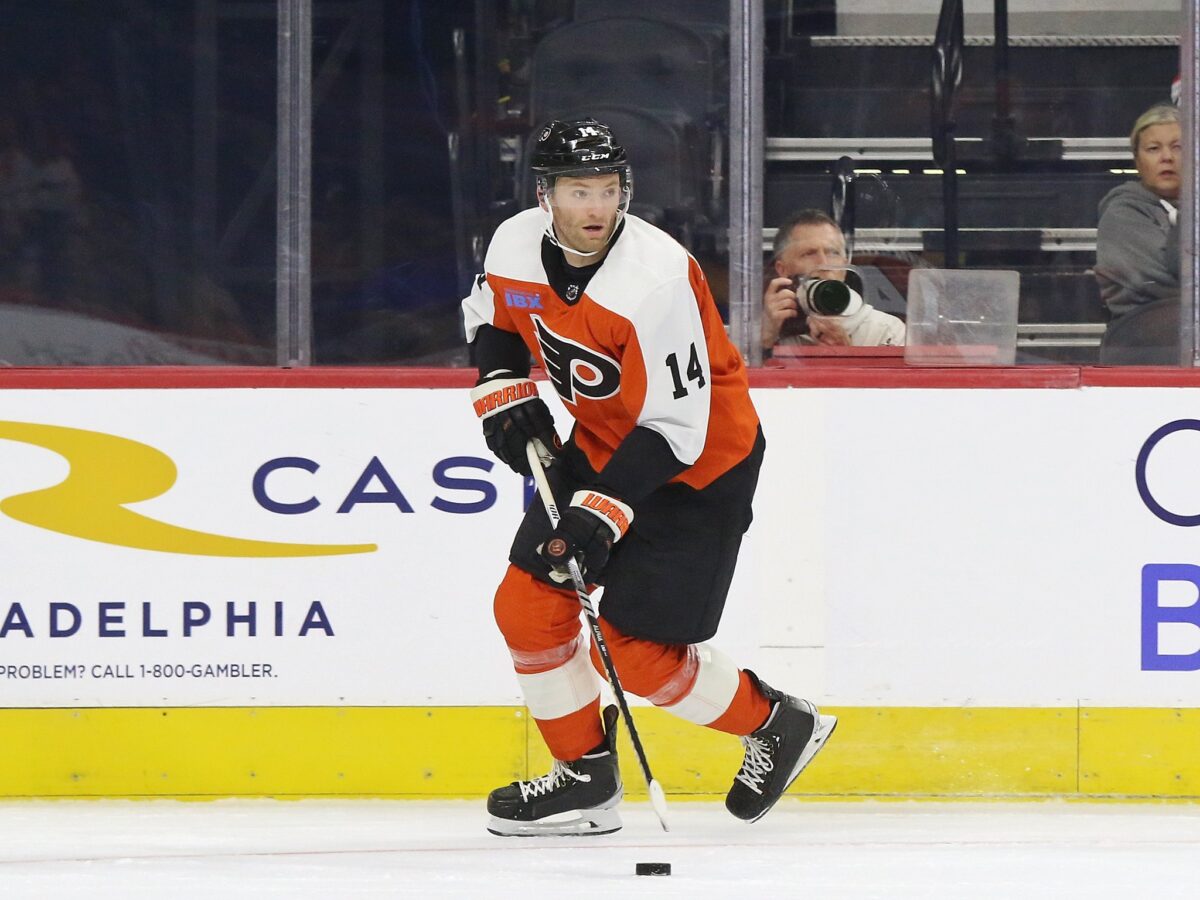
Couturier seems like he still has a lot of hockey left in him. Since he was a teenager in the 2011-12 season, he has been one of the Flyers’ most important players. He hasn’t always gotten his proper kudos, but he will still go down as one of the most important players in the history of the Flyers. With how much he has dedicated to the team, he deserves to be remembered for years to come.
